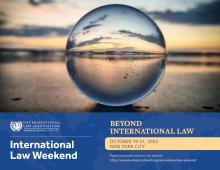NEW OPEN ACCESS BOOK: Sixty years after independence, Africa and international law: Views from a generation / Soixante ans apres les independances, l’Afrique et le droit international: Regards d’une generation, Apollin Koagne Zouapet (Ed), PULP 2023
This book emerged from the observation that in international law scholarship, few studies have been done on Africa as both object and subject of international law despite the involvement of African states and Africans in the international arena and their active participation in many debates. To fill this gap by examining, sixty years after the independence of African states, the place of Africa in international law and the way international law looks at Africa is the challenge that the contributors to this book, all internationalists of the 1980-1990 generation, have taken up. The book highlights the specificity of a particular African law and examines the African experience in this fi eld from an international law perspective.
